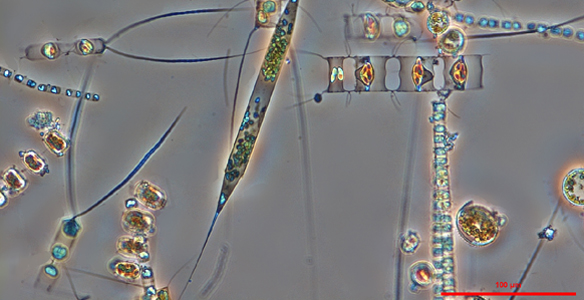Phytoplankton vanishing from warming oceans
Microscopic marine algae called phytoplankton that produce half the world’s oxygen and support most ocean life have been declining dramatically over the past century, Canadian researchers say.
“We should be very concerned … it’s extremely disturbing,” said Daniel Boyce, lead author of the study published Wednesday in Nature.
“Phytoplankton are the base of the marine ecosystem. It’s the fuel on which it runs …. Changes in phytoplankton abundance will ultimately affect everything higher in the food chain from tiny little zooplankton all the way up to large whales, valuable fisheries and humans at the top.”
The study found that the world is losing an average of one per cent of its phytoplankton each year, and the northern hemisphere has lost roughly 40 per cent since 1950.

Boyce, a PhD student in marine ecology at Dalhousie University in Halifax, said the decline appears linked to rising surface temperatures in the ocean.
Until now, researchers have relied almost solely on satellite images to estimate the global phytoplankton growth, and those data only go back a few decades, said Boyce.
The measurements are strongly correlated with the amount of phytoplankton in the water, and give almost exactly the same results as modern measurements from satellite images.
“It appears to be very accurate,” Boyce said.
Phytoplankton live close to the surface of the ocean so they have access to sunlight, which they use to make sugars through photosynthesis. In the process, they produce about half the world’s oxygen and remove carbon dioxide from the atmosphere, said Worm.
But they also need nutrients to grow, Boyce said, and those are brought up from deeper waters by mixing.
As the ocean surface gets warmer, it tends to form layers that no longer mix well with deeper waters.
“That makes the ocean more stable, which limits the amount of nutrients delivered to phytoplankton and adversely affects their growth,” Boyce added.
Besides forming the basis for the food chain, phytoplankton have a large effect on the carbon cycle, and therefore the stability of the global climate, the study said.
In fact, some people have proposed adding more nutrients to ocean water to boost phytoplankton growth in an effort to reduce carbon dioxide levels in the atmosphere.
The researchers hope their results will be a “wake-up” call and that scientists will continue to monitor global phytoplankton concentrations in coming years to see if the trend continues. In the meantime, they think more research needs to be done on the possible effects that declining phytoplankton could have on fisheries, climate and other aspects of ocean health.
Read more: http://www.cbc.ca/technology/story/2010/07/28/phytoplankton-vanishing.html#ixzz0vsqNeYfY
“We should be very concerned … it’s extremely disturbing,” said Daniel Boyce, lead author of the study published Wednesday in Nature.
“Phytoplankton are the base of the marine ecosystem. It’s the fuel on which it runs …. Changes in phytoplankton abundance will ultimately affect everything higher in the food chain from tiny little zooplankton all the way up to large whales, valuable fisheries and humans at the top.”
The study found that the world is losing an average of one per cent of its phytoplankton each year, and the northern hemisphere has lost roughly 40 per cent since 1950.

Boyce, a PhD student in marine ecology at Dalhousie University in Halifax, said the decline appears linked to rising surface temperatures in the ocean.
Until now, researchers have relied almost solely on satellite images to estimate the global phytoplankton growth, and those data only go back a few decades, said Boyce.
The measurements are strongly correlated with the amount of phytoplankton in the water, and give almost exactly the same results as modern measurements from satellite images.
“It appears to be very accurate,” Boyce said.
Phytoplankton live close to the surface of the ocean so they have access to sunlight, which they use to make sugars through photosynthesis. In the process, they produce about half the world’s oxygen and remove carbon dioxide from the atmosphere, said Worm.
But they also need nutrients to grow, Boyce said, and those are brought up from deeper waters by mixing.
As the ocean surface gets warmer, it tends to form layers that no longer mix well with deeper waters.
“That makes the ocean more stable, which limits the amount of nutrients delivered to phytoplankton and adversely affects their growth,” Boyce added.
Besides forming the basis for the food chain, phytoplankton have a large effect on the carbon cycle, and therefore the stability of the global climate, the study said.
In fact, some people have proposed adding more nutrients to ocean water to boost phytoplankton growth in an effort to reduce carbon dioxide levels in the atmosphere.
The researchers hope their results will be a “wake-up” call and that scientists will continue to monitor global phytoplankton concentrations in coming years to see if the trend continues. In the meantime, they think more research needs to be done on the possible effects that declining phytoplankton could have on fisheries, climate and other aspects of ocean health.
Read more: http://www.cbc.ca/technology/story/2010/07/28/phytoplankton-vanishing.html#ixzz0vsqNeYfY
You can return to the main Market News page, or press the Back button on your browser.

